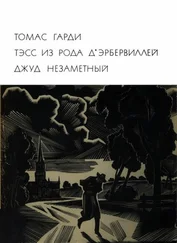| It was the third day of the estrangement. |
Шел третий день их отчуждения. |
| Some might risk the odd paradox that with more animalism he would have been the nobler man. |
Пожалуй, кому-нибудь мог бы прийти в голову парадокс: если бы у Клэра животное начало было сильнее, он вел бы себя благороднее. |
| We do not say it. |
Но мы так не говорим. |
| Yet Clare's love was doubtless ethereal to a fault, imaginative to impracticability. With these natures, corporal presence is something less appealing than corporal absence; the latter creating an ideal presence that conveniently drops the defects of the real. |
И все же любовь Клэра действительно была слишком духовной, для повседневной жизни слишком неземной; таким натурам присутствие любимого существа нужно не так, как его отсутствие, ибо в разлуке создается идеальный образ, лишенный реальных недостатков. |
| She found that her personality did not plead her cause so forcibly as she had anticipated. |
Тэсс убедилась, что ее присутствие не оказывает на него такого влияния, на какое она надеялась. |
| The figurative phrase was true: she was another woman than the one who had excited his desire. |
Его метафора оправдалась: она была другой женщиной - не той, которую он желал. |
| "I have thought over what you say," she remarked to him, moving her forefinger over the tablecloth, her other hand, which bore the ring that mocked them both, supporting her forehead. |
- Я обдумала то, что ты сказал, - заметила она, чертя указательным пальцем по скатерти и поддерживая голову другой рукой, с обручальным кольцом, которое словно издевалось над ними. |
| "It is quite true, all of it; it must be. |
- Ты совершенно прав, прав во всем. |
| You must go away from me." |
Ты должен от меня уехать. |
| "But what can you do?" |
- Но что же ты будешь делать? |
| "I can go home." |
- Я могу вернуться домой. |
| Clare had not thought of that. |
Клэр об этом не подумал. |
| "Are you sure?" he inquired. |
- В самом деле? - спросил он. |
| "Quite sure. |
-Да. |
| We ought to part, and we may as well get it past and done. |
Мы должны расстаться; и уж лучше поскорее с этим покончить. |
| You once said that I was apt to win men against their better judgement; and if I am constantly before your eyes I may cause you to change your plans in opposition to your reason and wish; and afterwards your repentance and my sorrow will be terrible." |
Ты как-то мне сказал, что я притягиваю к себе мужчин вопреки их рассудку, и если я постоянно буду у тебя перед глазами, ты, пожалуй, изменить свое решение наперекор желанию и здравому смыслу. А потом твое раскаяние причинит мне страшную боль. |
| "And you would like to go home?" he asked. |
- А ты бы хотела вернуться домой? - спросил он. |
| "I want to leave you, and go home." |
- Я хочу расстаться с тобой и уехать домой. |
| "Then it shall be so." |
- Значит, пусть будет так. |
| Though she did not look up at him, she started. |
Она вздрогнула, не поднимая глаз. |
| There was a difference between the proposition and the covenant, which she had felt only too quickly. |
Слишком остро почувствовала она разницу между предложением и договором. |
| "I feared it would come to this," she murmured, her countenance meekly fixed. |
- Я боялась, что дело этим кончится, - прошептала она; лицо ее было покорно и казалось растерянным. |
| "I don't complain, Angel, I-I think it best. |
- Я не жалуюсь, Энджел... Я... я думаю, что так будет лучше. |
| What you said has quite convinced me. |
Твои слова окончательно меня убедили. |
| Yes, though nobody else should reproach me if we should stay together, yet somewhen, years hence, you might get angry with me for any ordinary matter, and knowing what you do of my bygones, you yourself might be tempted to say words, and they might be overheard, perhaps by my own children. |
И даже если никто не стал бы меня упрекать, живи мы вместе, пожалуй, спустя много лет ты сам можешь рассердиться на меня из-за какого-нибудь пустяка и, зная о моем прошлом, бросишь мне упрек, который услышат мои дети. |
| O, what only hurts me now would torture and kill me then! |
И то, что сейчас причиняет мне только боль, будет для меня тогда пыткой и убьет меня! |
| I will go-to-morrow." |
Я уеду... завтра. |
| "And I shall not stay here. |
-И я здесь не останусь. |
| Though I didn't like to initiate it, I have seen that it was advisable we should part-at least for a while, till I can better see the shape that things have taken, and can write to you." |
Хотя я и не хотел заговаривать об этом первый, но считал, что будет разумнее расстаться хотя бы на время, пока я не дам себе отчета в случившемся. А потом я могу тебе написать. |
| Tess stole a glance at her husband. |
Тэсс украдкой взглянула на мужа. |
| He was pale, even tremulous; but, as before, she was appalled by the determination revealed in the depths of this gentle being she had married-the will to subdue the grosser to the subtler emotion, the substance to the conception, the flesh to the spirit. |
Он был бледен, даже дрожал, но, как и раньше, ее поразила решимость этого кроткого человека, за которого она вышла замуж, воля его, подчиняющая грубые эмоции эмоциям более возвышенным, материю - идее, плоть - духу. |
| Propensities, tendencies, habits, were as dead leaves upon the tyrannous wind of his imaginative ascendency. |
Склонность, стремления, привычки были словно сухие листья, подхваченные буйным ветром его непреклонной воли. |
| He may have observed her look, for he explained-"I think of people more kindly when I am away from them"; adding cynically, "God knows; perhaps we will shake down together some day, for weariness; thousands have done it!" |
Заметив ее взгляд, он пояснил свои слова: - Я лучше думаю о людях, когда нахожусь вдали от них, - и добавил цинично: - Кто знает, быть может, когда-нибудь мы сойдемся от скуки; так бывало со многими! |
| That day he began to pack up, and she went upstairs and began to pack also. |
В тот же день начал он укладывать свои вещи, и она, поднявшись к себе, последовала его примеру. |
| Both knew that it was in their two minds that they might part the next morning for ever, despite the gloss of assuaging conjectures thrown over their proceeding because they were of the sort to whom any parting which has an air of finality is a torture. |
Оба думали об одном и знали это: быть может, на следующее утро они расстанутся навеки, хотя сейчас и прикрывали отъезд успокоительными предположениями, так как оба принадлежали к той породе людей, для которых мысль о всякой разлуке, грозящей стать вечной, была пыткой. |
| He knew, and she knew, that, though the fascination which each had exercised over the other-on her part independently of accomplishments-would probably in the first days of their separation be even more potent than ever, time must attenuate that effect; the practical arguments against accepting her as a housemate might pronounce themselves more strongly in the boreal light of a remoter view. |
И он и она знали, что в первые дни разлуки взаимное их влечение - с ее стороны нимало не зависящее от его добродетелей - может быть сильнее, чем когда бы то ни было, но время заглушит его; практические доводы, в силу которых он отказывался принять ее как свою жену, обретут новую силу в холодном свете грядущих дней. |

![Томас Вулф - Взгляни на дом свой, ангел [английский и русский параллельные тексты]](/books/32195/tomas-vulf-vzglyani-na-dom-svoj-angel-anglijskij-thumb.webp)
![Агата Кристи - На краю [английский и русский параллельные тексты]](/books/32247/agata-kristi-na-krayu-anglijskij-i-russkij-paralle-thumb.webp)
![Сакс Ромер - Ведьмино отродье [английский и русский параллельные тексты]](/books/33237/saks-romer-vedmino-otrode-anglijskij-i-russkij-thumb.webp)
![Агата Кристи - Объявлено убийство [английский и русский параллельные тексты]](/books/33247/agata-kristi-obyavleno-ubijstvo-anglijskij-i-russ-thumb.webp)
![Фрэнсис Фицджеральд - По эту сторону рая [английский и русский параллельные тексты]](/books/34130/frensis-ficdzherald-po-etu-storonu-raya-anglijskij-thumb.webp)

